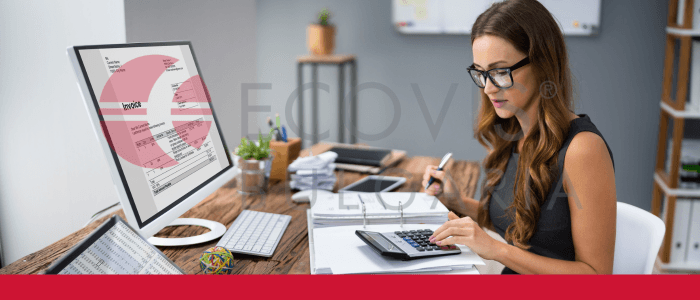
Which person is the "head" as far as accounting is concerned
Ecovis | 14 January 2025
Do you know who is responsible for the accounting of an enterprise? Who is the manager referred to in the Accounting Act?
Or maybe you're interested in what his or her duties are, and even what happens if the employment, service, or contractual relationship with the person in charge of a business's accounting is terminated?
If we run a business, we need to know exactly who that person is and what their job involves - what their responsibilities are and what happens when they are not met. In the next few lines of this article by Ecovis Bulgaria, we will look at what it actually means to be a "manager" in the context of accounting.
Stay tuned to learn everything you need to know!
What is a "manager" under the Accounting Act?
In accounting, the term "manager" has a clear definition:
"Manager of an enterprise" is a person or persons who personally manage the enterprise in their capacity as owners, managers or authorized by contract, who are responsible for the entire economic activity of the enterprise to the owner or owners - shareholders, partners, local government or the state.
As stated in the Act, the manager is not necessarily an accountant or financial expert. However, he is responsible for ensuring that the accounts are properly kept.
This means that all documents, accounts and financial must be accurate and comply with the law.

IMPORTANT DETAIL - even if you hire an outside accountant or firm for accounting services, tax services or audit services the law still points to the manager as the person ultimately responsible.
Specifics of the manager's work in accounting
When we talk about an accounting manager, the first thing to understand is that this role is not just administrative.
What do we mean? The manager is not the person who just signs documents. He or she is also responsible for all accounting processes and compliance with the law.
According to the Accounting Act:
*** Art. 16.** (1) The head of the enterprise:*
1. approve the individual chart of accounts of the enterprise;
2. organize the current accounting in accordance with the provisions of this Law;
3. establish the form of accounting which ensures the synchronised implementation of chronological and systematic (analytical and synthetic) accounting;
4. be responsible for the preparation, content and publication of the financial statements and annual reports required by this Law;
5. determine the periodicity of the financial statements for the management of the enterprise;
6. (supplemented, SG 72/2024, in force from 6.07.2024) be responsible for the independent financial audit and the engagement of registered auditors to express assurance on sustainability;
7. determines the procedure and method for carrying out the inventory;
8. be responsible for the preservation of accounting information in the manner and within the time limits set out in Section III;
9. determine the order and movement of accounting records from the time they are created or received by the enterprise until they are destroyed or surrendered in accordance with this Act;
(2) (Suppl. - SG 105/2023, in force from 1.01.2024, amend. 72 of 2024, in force from 6.07.2024) The head and the members of the management and supervisory body of the enterprise shall be responsible for the preparation and publication of the annual financial statements, the consolidated financial statements and the annual reports referred to in Chapter Seven, as well as for the performance of an independent financial audit and of an engagement to express assurance on sustainability by registered auditors in accordance with the requirements of this Law and in accordance with their powers under the Commercial Law. 2.
As mentioned just above, although many of these responsibilities are undertaken by accountants, under the Act they are the duties of the manager. It is therefore important to work with a good accountant. And it remains for the supervisor to become familiar with which duties are assumed by accounting firm (present in the contract) and which are not.
What happens if the employment, service or contractual relationship with the supervisor is terminated?
As a business owner or organization, you cannot anticipate every situation. Some executives leave, others retire and still others are terminated.
What happens to the accounting and the responsibility of the manager in this case?
According to the Accounting Act:
*** Art. 14.** (1) Upon termination of an employment, service or contractual relationship with a person who performs current accounting and prepares financial statements, the accounting documentation shall be handed over to a person designated by the head of the enterprise.
(2) Acceptance and delivery under par. 1 shall be made in the presence of a committee in the order and manner determined by the head of the enterprise.
(3) Upon termination of the employment, service or bond relationship of the head of the enterprise, the head of the enterprise shall hand over to a person designated by the relevant competent authority of the enterprise all accounting and other business records in his possession.
I.e. the manager must explicitly determine, preferably in writing, to whom, how and when the documentation is to be handed over.
If this process is not properly organised, the business could be at serious risk. Failure to file reports or to keep accurate accounting records can result in fines and other penalties.

What is NOT allowed and what happens if the regulations are not followed?
The Accounting Act has clear limits on what is not allowed to ensure accuracy, fairness, transparency and the provision of real data:
*** Art. 9.** Not allowed:*
1. recording of business transactions in off-books or registers;
2. accounting for fictitious or insufficiently identified transactions, non-existent expenses, and liabilities with an inaccurately determined object, made for the purpose of bribing officials or concealing a bribe. *.
Ignoring these rules can result in serious fines, administrative penalties or even criminal liability. And according to the Act:
Article 68. (1) (Amended, SG No. 105 of 2023, in force from 1.01.2024) A manager who violates the provision of Article 9 shall be punished by a fine of BGN 5,000 to BGN 15,000 and the enterprise shall be imposed a pecuniary penalty of BGN 10,000 to BGN 20,000.
(2) In case of a repeated violation of par. 1 a fine or a pecuniary sanction of double the amount shall be imposed
The sanction in Article 68 is only for infringements under Article 9
For the remaining offence, the other provisions as specified in the Accounting Act shall be imposed:
Art. 77. (1) Whoever fails to fulfil any other obligation arising from this Act shall be liable to a fine of BGN 200 to BGN 1,000 and the enterprise shall be liable to a pecuniary penalty of BGN 300 to BGN 2,000.
(2) In case of a repeated violation under par. 1, a fine or a pecuniary sanction of double the amount shall be imposed.
It is important to note that liability cannot be transferred. Even if the accountant makes a mistake, it is the manager who remains liable to the authorities of the law.
The role of the manager in accounting
Being a "leader" when it comes to accounting isn't just a corporate role - it's a responsibility.
The Accountancy Act clearly sets out the obligations, and the consequences for non-compliance are serious.

If you are in a management position, you should not overlook the importance of this post.
With the right approach and a professional team, we can ensure that everything in our accounting department is under control. This way we will save ourselves a heap of fines, penalties and make sure we comply with all the laws.
 Make an inquiry
Make an inquiry